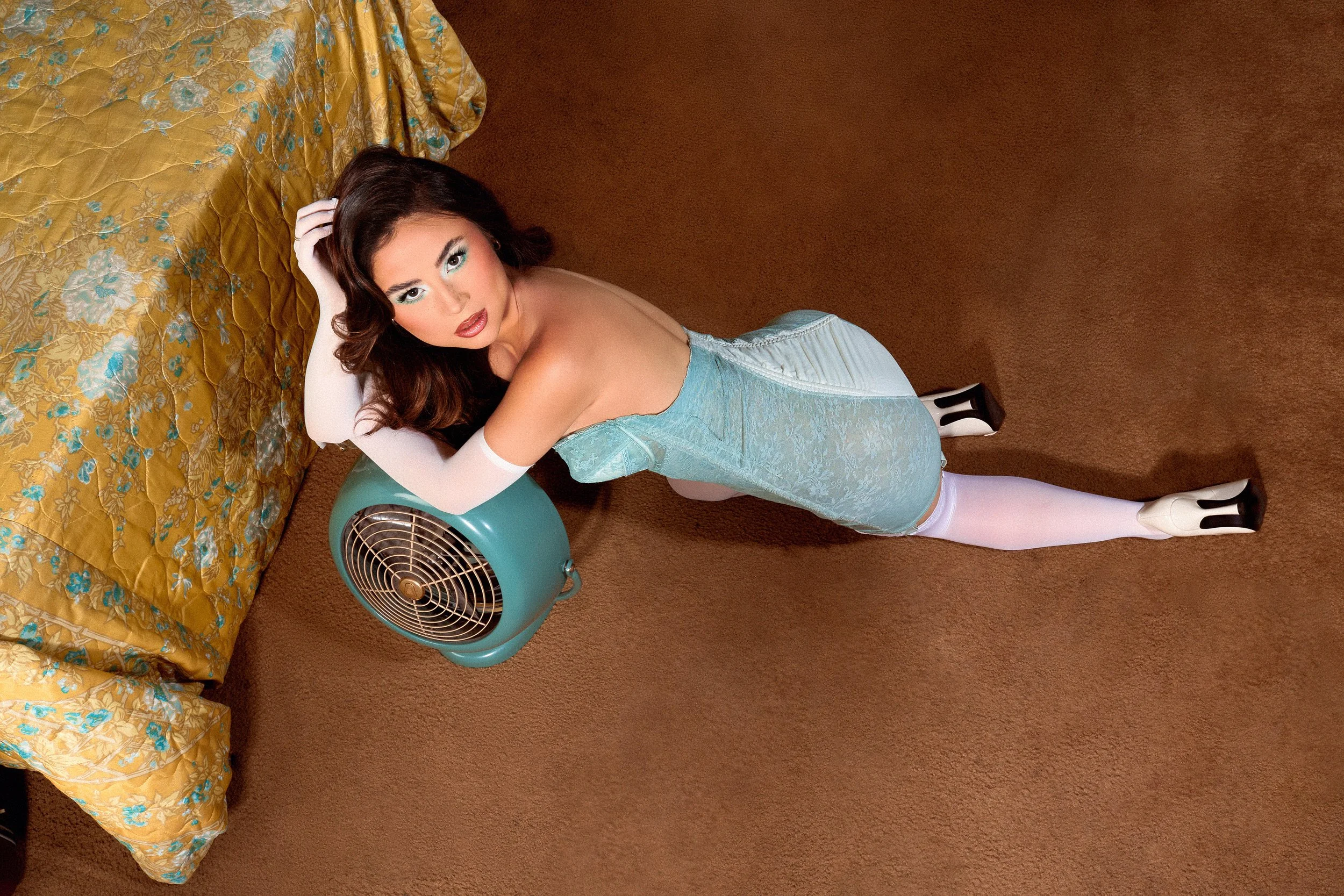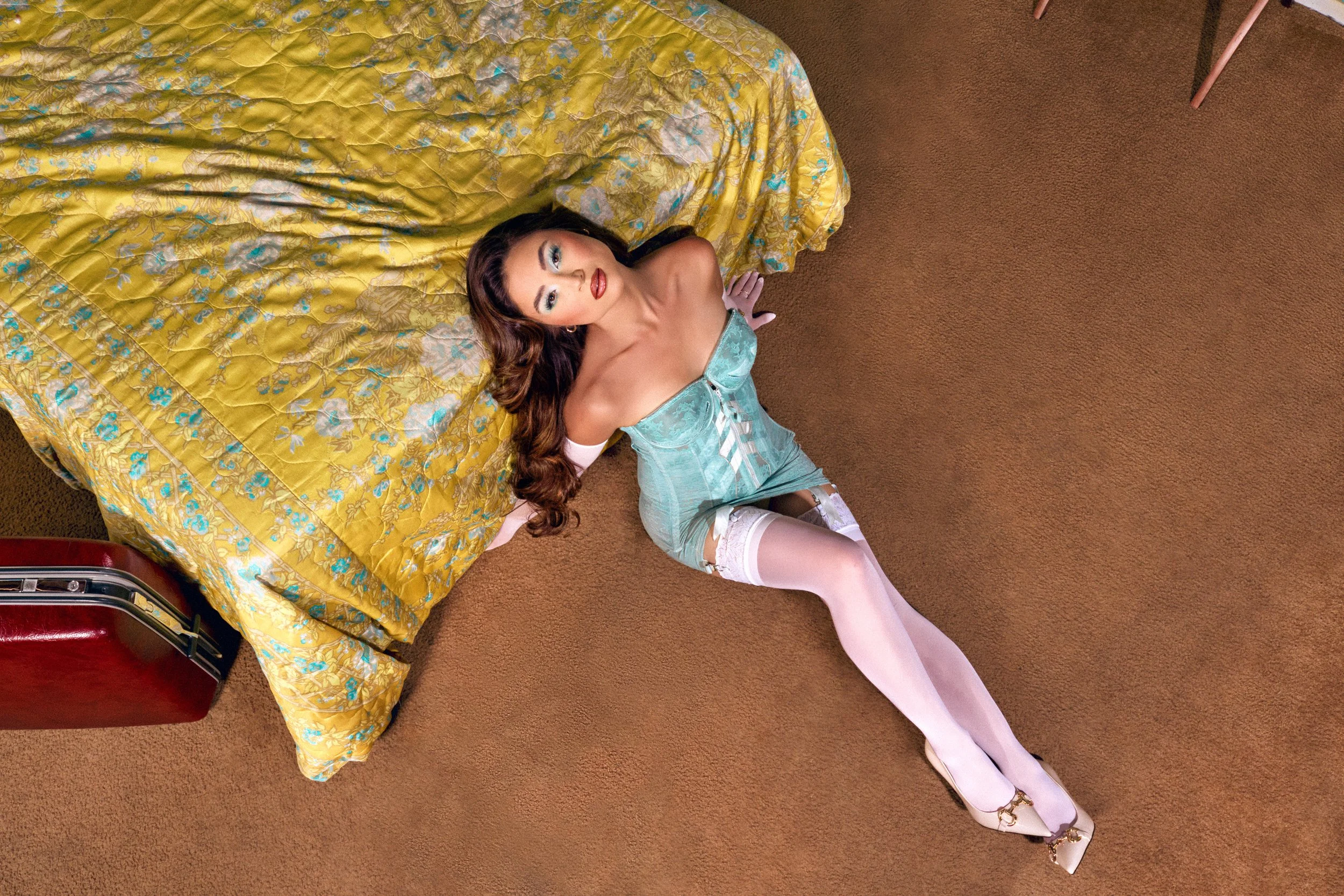Q&A: Tiger La Flor's “Motel 6” Captures Bittersweet Threshold Between Healing and Moving On
INTERVIEW
INTERVIEW
☆ BY KIMBERLY KAPELA ☆
Photo Credit: Kirt Barnett
TIGER LA FLOR HOPES YOU FIND HER IN THE WIND — After introducing herself earlier this spring with the dreamy, Americana-infused Drugstore Cowgirl, rising Asian American indie pop artist Tiger La Flor returns with a new single that signals both a continuation and evolution of her story. “Motel 6” marks her first release since her shimmering debut EP Drugstore Cowgirl. With her signature blend of dreamy indie textures and the dusty spirit of Americana, Tiger once again proves herself a powerful new voice at the intersection of heartache and hope.
Where Drugstore Cowgirl explored love, loss, and longing through the lens of wide-open roads, “Motel 6” picks up on the other side of that heartache. “This is the last tinge of that heartbreak,” Tiger says. “It really hints at that feeling of a new beginning, but there’s still the context of what you’re leaving behind.”
Written during a healing road trip down the Pacific Coast Highway following a breakup, “Motel 6” chronicles Tiger’s journey through redwood forests, over the Golden Gate Bridge and into the sun-drenched haze of Southern California. The track captures the liminal space between letting go and holding on, that moment when your body is in motion but your heart is still tethered to someone in the rearview mirror. “I wanted to capture that spirit of that feeling when you're moving on physically, but emotionally, you're still longing for somebody,” Tiger says.
Sonically, “Motel 6” draws inspiration from the golden harmonies and melodic soul-searching of Fleetwood Mac, with lush guitars and windswept vocals that feel nostalgic and cathartic. It's a song built for driving down coastal highways with the windows down, soundtracking the ache of memories that still linger even as you're propelled toward something new.
Among the song’s most striking lines is the lyric “I hope you find me in the wind blowing behind me,” which Tiger names as her favorite. It’s a haunting invocation—simultaneously a farewell and a wish to remain unforgettable.
There’s a distinct wistfulness to “Motel 6” as it lives in the space between chapters, not quite finished with the old one but beginning to glimpse the next. It’s a song that doesn’t pretend closure is easy or quick, but instead honors the reality that healing is a slow, nonlinear process.
“Motel 6” acts as both a closing chapter and an entryway into a new era for Tiger La Flor. While Drugstore Cowgirl bathed in the gauzy glow of heartbreak, this new single hints at something freer, more forward-facing. She may still be in the process of letting go, but the car is already moving—and with “Motel 6,” so is her sound.
Photo Credit: Kirt Barnett
LUNA: Welcome back and thank you for talking to Luna again. It's super exciting to have you back since the last time we talked about your Drugstore Cowgirl EP. I would love to catch up and see how life has been treating you and what have you been up to since the last time we talked.
TIGER LA FLOR: Since the release, I’ve been working on a whole new body of work that feels like a continuation of Drugstore Cowgirl, but also I'm feeling bolder and more ambitious now than I did during Drugstore Cowgirl. I’m revisiting some of the topics that were in Drugstore Cowgirl, but almost through the lens of having put that project out, and feeling how far can I push this artistically, which is an exciting feeling.
LUNA: What inspires you to push boundaries within your sound? Are there any specific experiences, artists, or moments that have encouraged you to explore new musical territories?
TIGER LA FLOR: I just love old music, so I'm always just listening to 60s and 70s music which has been really inspiring to me. I've been listening to a lot of The Beach Boys, a lot of The Beatles, The Mamas and Papas and Abba. These artists are what really pushed me, because their music is just obviously iconic, but the complexity itself really drives me. Sometimes the stuff that I hear today on the radio feels different than what was going on back then. There was so much complexity from the weird instruments of The Beatles to the layered harmonies of The Beach Boys and trying to crack that today I find super inspiring using those as a North Star artistically, and trying to push myself to explore new territory and be experimental.
LUNA: Are there particular moods or themes you find yourself gravitating towards when writing and performing? How do you channel these into your music?
TIGER LA FLOR: I think with Drugstore Cowgirl, I was definitely in an era of heartbreak, and so a lot of that record was exploring heartbreak, and with this new record, as a person, I've healed so much since releasing Drugstore Cowgirl. It was fun to start diving into some lighter themes and more fun, post-healing themes. “Motel 6” is interesting, because I wrote that song before I ever wrote anything that came out on Drugstore Cowgirl. I'd say the thematically “Motel 6” touches upon more of that heartbreak era that was going on, but I envision it leading out into a project that is going to mostly center around the post-healing after Drugstore Cowgirl.
LUNA: “Motel 6” is your first release since Drugstore Cowgirl. What story does this single tell, and how does it expand or shift your sonic world?
TIGER LA FLOR: “Motel 6”is the story of the road trip that I took along the Pacific Coast Highway after my breakup. It describes that journey of going through the redwoods, crossing the Golden Gate Bridge, arriving in Southern California, and the juxtaposition of still missing this person, but knowing that you have to move on. I think sonically, it was really inspired by Fleetwood Mac. I love Fleetwood Mac, who doesn't, but I loved in “Dreams,” there’s a cool composure that is happening directly and also those references to nature are really liberating. I always loved the lyric, “thunder only happens when it’s raining.” There's lyrics in “Motel 6” that sonically touch upon the same world of trying to bring in these more natural Americana references.
My favorite lyric in “Motel 6” is, “I hope you find me in the wind blowing behind me,” and I wanted to capture that spirit of that feeling when you're moving on physically, but emotionally, you're still longing for somebody. I think it's a great entry point to lead into what's going to come. Because for me, this is the last tinge of that heartbreak. “Motel 6” really hints upon that feeling of it feels like the beginning of a new chapter, but there's still the context of what you're leaving behind. You haven't fully moved on, but it's the entry point into that new era.
LUNA: “Motel 6” and your EP both evoke the spirit of Americana through a dreamy, modern lens. Do you see yourself reclaiming or redefining that genre from your perspective?
TIGER LA FLOR: That's a great question. For me, Americana is so interesting, since no genre feels so American like it's even the name of the genre. As an Asian American artist, where there's almost no Asian American representation in Americana, I think there’s so much power in reclaiming that experience. I'm interested in putting my own twist on it too. Growing up in the Pacific Northwest, being Asian American, there's a kind of world that I come from that I want to represent within Americana, especially drawing upon like the scenery from the Pacific Northwest where I grew up, and then talking about my experiences through the lens of being an Asian American woman today.
LUNA: Drugstore Cowgirl introduced listeners to your world in such a vivid and poetic way. How do you feel you've grown as a songwriter and artist since releasing that EP?
TIGER LA FLOR: I think with Drugstore Cowgirl, it was my first experience making music in that genre with that Americana influence in it. I think being able to revisit it now, I'm just feeling a lot more, a lot more bold, a lot more ambitious. I'm really excited to really tackle those areas of music from the 60s and 70s, because they're complex eras to tackle musically. They’re songs I have always loved, but I almost felt too shy to try and tackle them on my first experience writing in this genre. I'm really excited to revisit all of those this round and try to really bring in those inspirations and meld things in a way that feels really fresh. I'm super excited for “Motel 6”and it's only getting weirder from here.
LUNA: What’s fueling your fire right now—musically or personally—that’s pushing you into this next chapter?
TIGER LA FLOR: I think with each release, it leaves you with this feeling of gratitude and accomplishment. The reception of Drugstore Cowgirl was great. I've been able to achieve these things that, as an artist, I'd always dreamed of — even being on the cover of a Spotify Asian-dedicated playlist was a huge goal. I think as I've reached these goals, I realized that I'm making music to impress myself, and so I think for this upcoming project, and these upcoming eras of releases, I'm really excited to go back to those artists and songs that I grew up loving that are deeper cuts and weirder music, and finding a way to translate them as stuff that you would hear playing on the radio, that is really driving me. I feel like I have forgotten about mainstream music, so I'm really excited to just bring old music back and do a project that's really focused on these artists that I grew up loving versus what is popular today.
LUNA: How are you feeling in this current era of your career and what does the rest of the year look like that you would like to share with Luna?
TIGER LA FLOR: I'm feeling really inspired in this current era of my career. I'm also feeling really excited to do some things that I haven't done before. I'm excited to go on tour. My sister and cousin played our first show in a while in Pittsburgh recently. I'm excited to hit the ground and start going on tour. I'm also excited to put out a full length album and that’s definitely something I want to work towards, and just stepping into that next era of my career where I can really have the freedom to really focus on this now. I’m trying to push boundaries with the music, and push boundaries myself with things that I've never done as an artist.
Photo Credit: Kirt Barnett



